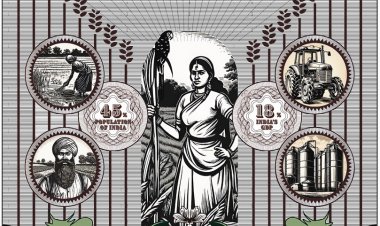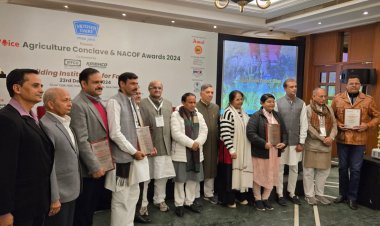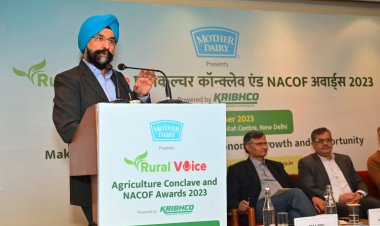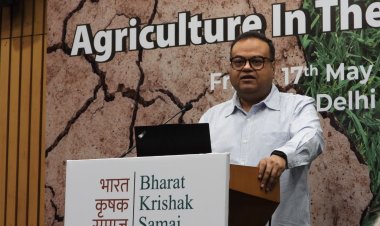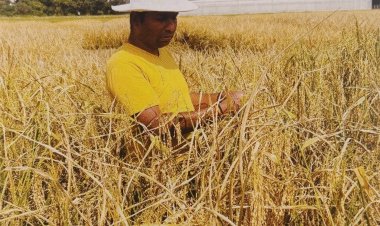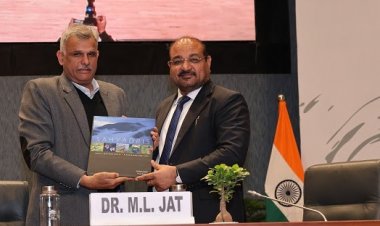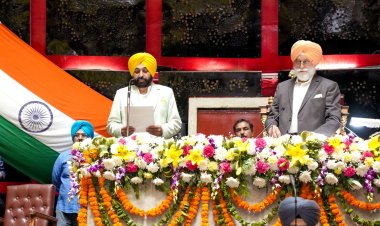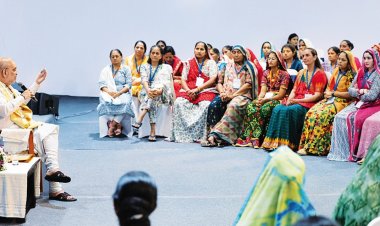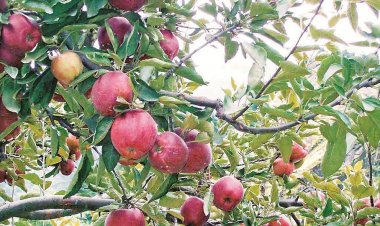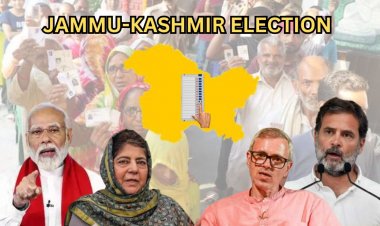In recent years, discussions have intensified on issues like increasing agricultural production to ensure the country's food security, promoting technology in agriculture, adopting flexible agricultural systems to deal with climate change. Everyone is worried about agriculture but there is no one to take care of the welfare of farmers, villages and rural citizens.
This emerged during a panel discussion at the 'Agenda for Rural India National Convening' program organized by media organization Rural Voice and NGO Socratus in Delhi earlier this month.
The topic of this panel discussion was ‘What does rural India want from elected representatives’. This panel discussion was moderated by senior journalist and former editor of news agency PTI, Rajesh Mahapatra.
There should be change for farmers
Esan, founder of Tamil Nadu Farmers Protection Association, said in response to the opening question of the panel discussion, “The system of cooperative society was created 100 years ago. Cooperative societies are for farmers, but the entire system has been captured by the leaders. Now they are forcing the farmers. Similarly, FPOs (Farmer Producer Unions) are definitely in the interest of farmers, gradually they will also be taken over by the leaders.”
He said that there is an agricultural policy in the country, but there is no farmer welfare policy. When it comes to protection of farmers, there is no Farmers Protection Act. The rights of farmers have been snatched away everywhere. Central government, state government, no official is ready to listen to the farmers. According to him, most of the MPs, MLAs, ministers are also from the farmer community, even IAS and IPS officers are from the farmer community, but no one has worked in the interest of the farmers.
It is said again and again that farmers are the backbone of the country, but how is the country running without a backbone. Everyone's hopes for food security rest on farmers and villages, but the way the costs are increasing and the produce is not getting a fair price, only the guarantee of MSP (Minimum Support Price) can benefit the farmers. . This is an agricultural country. There should be change for the farmers in this country.
Need to increase the pace of agriculture and farmer welfare: Dr. Amar Patnaik
Expressing some disagreement with him, Biju Janata Dal (BJD) MP Dr. Amar Patnaik said, “I do not think that agriculture and farmer welfare can be seen separately because without thinking about agriculture, farmers are Welfare cannot be thought about. Yes, I completely agree that no government has truly implemented the recommendations of the Swaminathan Commission regarding MSP. Since this did not happen, the condition of the farmers remains the same. However, it cannot be said that his condition has not improved. There has been improvement, but not to that level.”
He said that it also has to be understood that the increased price of MSP also affects the price that the consumer has to pay for the grains. In that situation the subsidy burden will be very high. We have to decide whether the country will have the resources to pay that subsidy because there are more important issues that require economic resources. Being realistic, I believe we are going in the right direction. The need is that we have to increase our productivity.
Productivity can be increased through better crop management, better irrigation, better water management, better soil management and better fertilizer management. This has not happened in the country. Second, what we are doing is in pieces. The innovation that is needed related to multi-cropping as well as multi-products in agriculture can be multi-cropping as well as pisciculture. Not all of these combinations have been worked out. In the agriculture and farmer welfare sector, things are not moving at the pace at which they need to move. But what has certainly happened is that farmers have made India self-reliant in agriculture providing food security to 1.4 billion people.
Situation of village as it is: KC Tyagi
Former MP of Lok Sabha and Rajya Sabha and senior leader of Janata Dal (U), KC Tyagi, while expressing his views in the panel discussion, said, “If we leave the islands of prosperity which we call economic progress, then the condition of villages will be very bad. Not much has changed. Villages are still victims of government neglect. Despite changing governments during the British era and after Independence, there was not much change in the situation of the village.
What is the real problem of the village? Apart from farming, where did the other farmers of the village go?
Where have the village blacksmith, potter, weaver, goldsmith, oilman, washerman and cobbler all gone? The idea of village autonomy was destroyed. Their businesses in the village were destroyed. These people went from village to city in search of employment but most of them are either working as laborers or doing some small work. Today we are number one in the world in the production of wheat, rice, sugar and many vegetables and fruits. Despite this, villages are being neglected. The priority remains the same even today.
In the first five-year plan, 35 percent of the funds were allocated for rural areas and 15 percent for industrial areas. In the subsequent five-year plans, the allocation to the rural sector decreased and that to the industrial sector increased. The neglect of the village started from there. NITI Aayog and all the institutions like these have nothing to do with village development, farming and farmers.”
Farmers will benefit only with MSP guarantee: VM Singh
VM Singh, national convenor of Rashtriya Kisan Mazdoor Sangathan, said, “The system in place today is wrong. India is an agricultural country but there is no provision of Indian Agricultural Service in our system. Looking at the condition of farming, farmers' children no longer want to do farming. Farmer's children today need livelihood. Even today we are adopting the policies of the British. We do not want to stop farming. Today land holdings are decreasing.
Farmers have an average of two to two-and-a-half acres of land. No farmer can eat for the whole year by cultivating such a small amount of land. To run their household, they have to work as laborers along with farming. In such a situation, they can be benefited only through MSP guarantee.” He said that earlier the farmer used to meet his other needs by selling the milk of cows and buffaloes, now he has also faced problems because fodder has become expensive due to which it has become difficult to rear cows and buffaloes.
If it is decided that milk will not be purchased from farmers at less than Rs 50 per litre, then farmers will remain interested in rearing cows. Similarly, if we talk about sugarcane farmers, they never get their payments on time. All governments are kind to sugar mill owners. MSP (Minimum Sale Price) of sugar has been arranged for them, but it is not being done for the farmers. We only want that farmers should get guarantee of MSP.
Farmers' condition worsened due to pro-market policies: Yudhvir Singh
Taking part in the discussion, National General Secretary of Bharatiya Kisan Union (BKU) Yudhvir Singh said that Chaudhary Charan Singh used to say that if Pandit Nehru had focused on rural development, industrial development was also necessary, if agriculture and villages had been given priority. Had it been granted today, the villages would have developed. Chaudhary Charan Singh also said that if we want to develop the country and build a strong nation, then migration will have to be stopped. The way migration from villages has taken place in the last 15-20 years is horrifying.
He said that due to the Green Revolution, agricultural production increased but as soon as the production became surplus, the market started dominating the farmers and the governments also became helpful in this. As the market became dominant, difficulties started increasing for the farmers. Farmers are dying because of the anti-farmer and pro-market policies of the government. When crops are harvested, the government takes decisions in support of the market and makes government purchases of the crops late. On one hand the government talks about doubling the income of farmers, on the other hand it takes anti-farmer decisions.
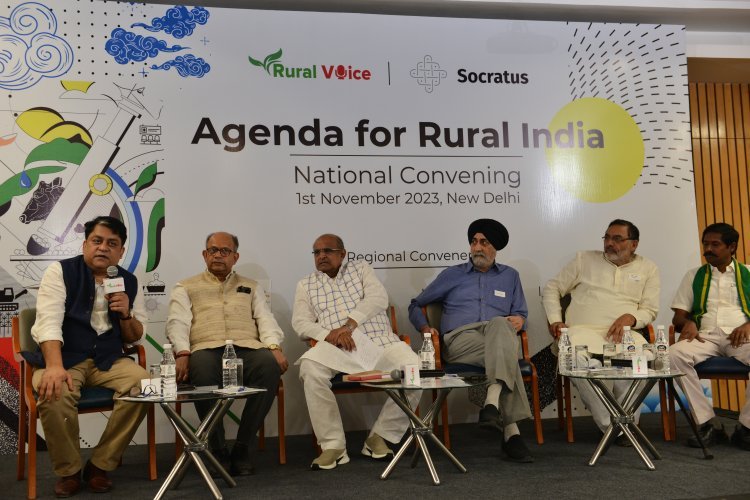



 Join the RuralVoice whatsapp group
Join the RuralVoice whatsapp group

















